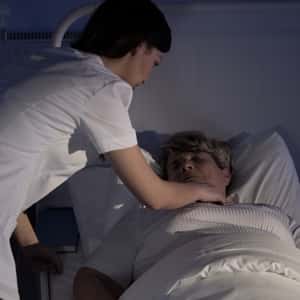
People who do shift work put their bodies through a lot of stress. Most of us adapt to getting up in the morning and going to bed at night. If we are reasonably regular about the times, our body clocks adjust and keep us in good shape. But shift work requires people to act against their natural body clocks. Many people are successful at this, though they may need some help sleeping during daylight hours. Is melatonin safe in this circumstance?
Is Melatonin Safe for Sleeping During the Day?
Q. I work as a nurse on night shift. I plan to do so until retirement, but I am also trying to do everything I can to stay healthy.
In order to sleep during the day, I take melatonin. I have trouble sleeping more than about three or four hours unless I take it. Is melatonin safe to continue?
A. There is concern that shift workers may be at increased risk of developing breast cancer (Current Environmental Health Reports, Sep. 2017). People who work night shifts have their natural rhythm of melatonin production disrupted, and this may play a role in cancer susceptibility. Spanish scientists have suggested that women like you should possibly take melatonin to offset this risk (Molecules, Feb. 6, 2018). They point out, however, that there are not enough clinical trials to evaluate this approach properly. You can read about potential risks at this link.
Melatonin May Help Shift Workers Sleep Better:
A painstaking review of the literature concluded that melatonin may help with sleeping problems associated with shift work (Cochrane Database of Systematic Reviews, Aug. 12, 2014).
However, a study of emergency physicians working night shifts found that
“Melatonin might have a limited benefit on sleep quality” (World Journal of Emergency Medicine, 2018, vol. 9, no. 4).
That sounds like a less than rousing endorsement. Not everyone finds melatonin helpful. One reader complains of a “hangover” effect.
Managing the Melatonin Hangover:
Q. I am one of the people who gets a melatonin “hangover” no matter how small the dose. A quarter of a 5 mg tablet still produces the hangover effect. I suffer the whole next day and then have trouble sleeping the next night, so I don’t even try it anymore for occasional insomnia. I would welcome other suggestions.
A. Many people do find a low dose of melatonin helps them fall asleep faster (Journal of Pineal Research, Aug. 2024). The scientists conducting this review recommend taking 4 mg three hours before bedtime.
You are not the only one to experience problems with this supplement. Some other readers report that taking melatonin interferes with their ability to sleep, so it is not a good insomnia solution for everyone.
Going outside for half an hour early in the day can sometimes help reset your biological clock so you can fall asleep more readily.
Magnesium supplements in the evening help some people. Others get relief from acupuncture or acupressure. One of the most effective nonpharmacological options for trouble sleeping is cognitive behavioral therapy for insomnia. If you cannot find a therapist offering this training locally, you may wish to search online. You will also find a database of sleep centers and therapists at the website of the American Academy of Sleep Medicine.
Learn More:
You will find more information on all these approaches as well as a number of helpful herbs in our eGuide to Getting a Good Night’s Sleep. We write about sleeping pills as well as melatonin and other non-drug options.
Citations
- Hansen J, "Night shift work and risk of breast cancer." Current Environmental Health Reports, Sep. 2017. DOI: 10.1007/s40572-017-0155-y
- González-González A et al, "Melatonin: A molecule for reducing breast cancer risk." Molecules, Feb. 6, 2018. DOI: 10.3390/molecules23020336
- Liira J et al, "Pharmacological interventions for sleepiness and sleep disturbances caused by shift work." Cochrane Database of Systematic Reviews, Aug. 12, 2014. DOI: 10.1002/14651858.CD009776.pub2
- Farahmand S et al, "Comparison of exogenous melatonin versus placebo on sleep efficiency in emergency medicine residents working night shifts: A randomized trial." World Journal of Emergency Medicine, 2018, vol. 9, no. 4. DOI: 10.5847/wjem.j.1920-8642.2018.04.008
- Cruz-Sanabria F et al, "Optimizing the time and dose of melatonin as a sleep-promoting drug: A systematic review of randomized controlled trials and dose-response meta-analysis." Journal of Pineal Research, Aug. 2024. DOI: 10.1111/jpi.12985

